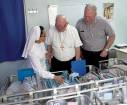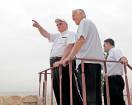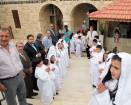







On his pastoral visit to Jordan last week, Cardinal Dolan witnessed firsthand the work and presence of the Catholic Near East Welfare Association (CNEWA), which supports projects assisting refugees from other countries in the Middle East as well as the small, native Christian community and others in that part of the land of the Bible.
The three-day itinerary, packed with stops at a number of health clinics and refugee support programs operated by a total of five congregations of women religious, gave Cardinal Dolan a greater appreciation of CNEWA’s approach of assisting projects already providing good service.
Work such as the Mother of Mercy Clinic in Zerqa, operated by the Dominican Sisters of St. Catherine of Siena, an Iraqi congregation serving a refugee population including Palestinians, Iraqis and Syrians. The clinic—on the property of a Latin Rite parish, St. Pius X, built in the 1950s with support from CNEWA benefactors—also is subsidized by the agency.
The same day, the visitors also toured the Italian Hospital in Amman, known as the Hospital of the Poor, administered by another Iraqi community, the Dominican Sister of the Presentation. CNEWA subsidizes a daily clinic for the poorest of the poor, mainly Iraqi and Syrian refugees, along with poverty-stricken Jordanians, who travel from the entire country for the quality care it offers.
The next day, they visited with the Franciscan Missionaries of Mary, who provide support to hundreds of Iraqi and Syrian refugees, especially young women, with the help of CNEWA, right in their convent, the House of Mary. They celebrated Mass in the convent chapel, and then had dinner with the sisters and refugee families.
“It’s not that we come in from above. We help them from below,” said the cardinal, speaking of CNEWA’s approach in an interview at its offices in the New York Catholic Center May 9. He had come that day to greet CNEWA’s staff the morning after his return to the archdiocese.
“I was so edified at the great work CNEWA does there.”
The cardinal traveled to Jordan as part of his responsibilities as chairman of the board of CNEWA, a papal agency that provides humanitarian and pastoral support by working with and through Eastern Catholic churches in the Middle East and elsewhere across the globe. He was joined by Bishop William Murphy of the Diocese of Rockville Centre, another CNEWA board member, and Msgr. John Kozar, CNEWA’s president. Also taking part were Ra’ed Bahou, CNEWA’s regional director for Jordan and Iraq, and Father James Cruz, the cardinal’s priest secretary.
The May 4-8 trip, which took place following the canonization ceremonies in Rome for SS. John Paul II and John XXIII, actually felt like “a dry run” for the visit that Pope Francis will make to the Holy Land later this month, Msgr. Kozar said.
“There is a tremendous excitement about the pope’s coming,” he said, adding that the positive feelings generated by the papal visit translated to warm greetings everywhere the group went. The pope’s visit to the Holy Land is schedule to begin in Amman, Jordan’s capital, on May 24.
The visit to Jordan was Cardinal Dolan’s first. Three years ago he visited CNEWA’s projects in Syria and Lebanon, a trip that would be impossible today because of the continued unrest in Syria, he noted.
The picture in Jordan was a much different one, as the cardinal explained. The vast majority of the population is Muslim, the official religion, with the Christian population about 2 percent, and Catholics half of that. The cardinal complimented “the complete lack of acrimony among religions.”
“That was impressive to see,” he said.
He also offered praise to Jordan’s royal family, starting with King Abdullah II, for “encouraging that amity and that reconciliation and cooperation.”
The cooperation was much in evidence among Christians, too. One highlight was a first Holy Communion Mass at the Melkite Greek Catholic Church of St. Gregory in the largely Christian Bedouin village of Ader. Cardinal Dolan presided at the afternoon liturgy in which he and Bishop Murphy were joined by no less than three other prelates, including the apostolic nuncio for Jordan and Iraq, a Melkite archbishop and an Orthodox bishop.
The 22 children receiving Communion for the first time had learned some parts of the liturgy in English, and an honor guard of elders was formed to greet the cardinal and the other bishops.
“This was a historic day,” Msgr. Kozar said of the village where residents can trace their roots to the shepherd people “who came to adore (Jesus).”
That was not the only connection to the places of the Bible, as Cardinal Dolan, Bishop Murphy and the other clergymen spent most of one day visiting sites such as Bethany Beyond the Jordan, the site on the Jordan River where Jesus was baptized by John the Baptist. They also met at Mount Nebo with Franciscan Friars who are the guardians of the site, from which Moses viewed the Promised Land.
“It’s all so close, yet so divided,” the cardinal said of other parts of the Holy Land.
That’s not to say that Jordan doesn’t have its own challenges. The refugee situation, some 3 million in a population of around 7 million, including more than a million each from Syria and Iraq, has stretched Jordan’s capacity. So far, however, the country’s response, and that of its people, has been to open its arms wider, Msgr. Kozar said.
CNEWA responds similarly. In some places where the communities of religious women serve, it has taken time to build trust, especially when those served are not Catholic or Christian. Where they were not always wanted or even openly threatened, now the sisters are seen as allies, and even embraced as friends.
The visit to the convent of the Franciscan Missionaries of Mary in Amman, where the nuns help Iraqi and Syrian refugee families in an urban setting, proved the point. People spilled into every corner, some 300 in total. The Mass offered in the convent chapel, followed by dinner with the sisters and the families they serve, were high points.
“The Eucharist was for them something very powerful, for people of every age,” Msgr. Kozar said. “You could see this was at the center of their lives. The cardinal was touched by that.”
Both Cardinal Dolan and Msgr. Kozar used the term “ministry of accompaniment” to describe the way CNEWA relates to the people it serves.
The cardinal said, “We get the bang for the buck. None of these projects completely depend on us. We’re able to solidify them, and expand them and enhance them and encourage them, with CNEWA. We just want to help.”